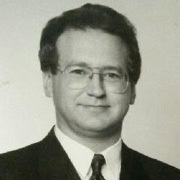
Lindsay Perigo
Born in 1951, Lindsay Perigo grew up in Feilding, where he preferred opera and political philosophy to sports. "When my peers were watching Maxwell Smart, I was reading Marx and Engels", he told magazine Full Context in 1997. At Feilding High School (where school colleague Tom Scott recalls him as intelligent and self-contained) Perigo conducted the school choir, endured bullies, and enjoyed reason-based examination of ideas: “saying why is this so and is this the best way it could be.”
After he dropped out of a music degree at Victoria University – lacking "any temperamental or philosophical empathy for listening to recordings of chainsaws, which we were expected to regard as music" – 18-year-old Perigo successfully auditioned as an announcer for the NZ Broadcasting Corporation.
By 1979 he was the anchor for Radio New Zealand’s flagship show, Morning Report. The show's producer Michael Lee described him as "a journalist of extraordinary ability". The following year Perigo won a Mobil Radio Award for Best Newscaster, and the Bill Toft Trophy for Broadcaster of the Year.
In 1984 he shifted to television, and was anchor and interviewer on a run of high profile TVNZ current affairs shows (Sunday, Eyewitness News, Frontline, News at 10). He became a prominent television personality who by 1990 had a show named after him, interviewing key figures of the day during a tumultuous era in Kiwi politics, as successive Labour governments, then National, upended political and economic orthodoxy.
His distinctive, unfazed interview style was described by a psychologist in a 1989 Evening Post profile as "soft-confronting", where a neutral disposition aimed to probe ideas rather than personalities. Perigo said he didn't "engage in those endless agony sessions" or "meaning-of-life-as-a-studio-interviewer questions".
In the Post profile Perigo professed privately-held libertarian political views, but claimed these held no sway over his public performance as an interviewer, "I have definite views and am definite about not imposing this on others. But I am under no obligation to pretend to agree with people holding opposing opinions, though I will willingly change my views when a better argument is presented."
His devil’s advocate approach saw a mid-interview walkout by Labour cabinet minister Bob Tizard but gained scoops, including Eyewitness interviews with Finance Minister Roger Douglas (on the day he was sacked by PM David Lange in 1988), and Colin Meads (on his return from coaching the controversial Cavaliers tour to South Africa in 1986). Perigo also hosted budget and election coverage, and political discussion shows like Counterpoint. In 1986 he presented the first live TV broadcast of a parliamentary sitting.
In the 1989 Post profile Perigo expressed concerns about the depth of debate he was able to elicit on television: "we’ve become a sort of society where people don't analyse an argument: they attach brandnames to people who proffer arguments and think that they’ve dealt with the argument that way". In 1993 he infamously abandoned the medium, claiming that TVNZ news and current affairs was "braindead", and that stories of celebrities and trapped cats had superseded politics.
By now Perigo had become a "full-time proselytiser for freedom and individualism" (as Full Context called him) and a follower of the Objectivist philosophies of writer Ayn Rand. He was a founding member and the first leader of the Libertarianz political party ("committed to the concept of a free society with a free market economy"), and of objectivist blog Sense of Life Objectivists (SOLO). He is former editor of Free Radical magazine, and a collection of his political writing was self-published in 2012 (The Total Passion for the Total Height). During a brief stint working for the Act Party, he wrote the 2011 speech in which Don Brash argued for decriminalising marijuana for personal use.
His childhood passion for opera has endured, finding expression in writing on Mario Lanza (compiled in 2013 book The One Tenor). He counts opera singers José Carreras and Luciano Pavarotti among his interviewees.
Since 1993 his main broadcasting presence has been on radio, with 'soft-confronting' being replaced by outspoken libertarian shows on Radio Pacific (The Politically Incorrect Show) and a breakfast show on the now defunct Radio Liberty. In the 2000s he spent a number of years as political editor at RadioLIVE; after a short stint as a RadioLIVE talk show host he made headlines in 2010 for a critique of TV journalists' diction, before leaving the show in the aftermath.
Despite his public denunciation of the medium, Perigo has occasionally returned to television. Aside from 2011's Perigo!, a weekly show on Face TV, he has been a commentator on political panel shows like The Ralston Group and Eye to Eye; a guide to his hometown Feilding in a 1998 episode of McCormick; a guest of Brian Edwards on talk show Edwards at Large); and political editor for Prime TV from 2004 to 2005.
Profile published on 19 June 2017
Sources
Lindsay Perigo website. Accessed 19 June 2017
Bruce Jesson, 'A Nineties drop-out' (Interview) - Metro, October 1997
Karen Reedstrom, 'Interview with Lindsay Perigo' - Full Context, September 1997, volume 10, number 1
Victor van Wetering, ‘Perigo: private man in public life’ (Interview), The Evening Post, 18 February 1989, page 31